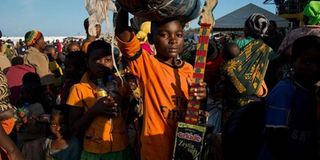It is time the world took up its share of the burden of looking after refugees

Burundian refugees wait to be transferred from Lake Tanganyika Stadium in Kigoma to Nyarugusu Refugee Camp, on May 20, 2015. PHOTO | DANIEL HAYDUK |
What you need to know:
- It is clear that the East African countries cannot overlook the refugee crisis as it directly affects them.
- The international community cannot afford to look the other way any more.
According to the United Nations High Commissioner for Refugees (UNHCR), Kenya and Tanzania have camps with some of the highest refugee numbers in the world.
The Dadaab, which hosts more than 350,000 refugees, is the largest in the world. Kenya, Uganda, and Tanzania together host close to one million refugees, making them three of the top 10 refugee-hosting countries in sub-Saharan Africa.
Most of these camps are overcrowded. Nyarugusu camp in Tanzania was set up 18 years ago to host 50,000 refugees from the Democratic Republic of Congo, but it currently has 65,000 Congolese refugees and 35,000 new arrivals from Burundi.
Dadaab, established more than 20 years ago to host 90,000 refugees, currently, has four times that number. This has put pressure on provision of basic services such as health, education, and sanitation.
As we marked this year’s World Refugee Day last Saturday, it was clear that the East African countries cannot overlook the refugee crisis as it directly affects them. The myriad conflicts in the Horn of Africa and the Great Lakes region continue to drive thousands of refugees across borders.
The decades-long conflicts in South Sudan and Somalia have created the biggest humanitarian crisis that the East Africa Community (EAC) countries have had to deal with. Uganda and Kenya have been the hosts of most of these refugees.
And just when hope was starting to bloom that South Sudan was getting back on its feet, the December 2013 conflict broke out, sending 450,000 refugees to Kenya’s and Uganda’s doorsteps. Recently, the flight of 100,000 Burundians into neighbouring Rwanda, Tanzania, and DRC following political unrest has added yet another dimension to the humanitarian situation for these countries to deal with.
The EAC has made great progress since its re-establishment in 1997. It has created a common market and is in the process of negotiating to have a common currency and eventually a political federation.
The five member countries combined are set to be a force to reckon with, especially if South Sudan and Somalia are allowed to join the regional bloc.
The EAC countries have made an effort to address the plight of refugees through provision of land for camps and settlements. In addition, they are signatories of the Geneva Convention that compels countries to extend protection to refugees.
However, this assistance is not likely to be sustained if the number of refugees keeps increasing. This puts pressure on the already crowded camps and more resources are needed to ensure that the standards of health, education, and livelihoods are maintained.
Secondly, the resources available for regional conflicts are dwindling in the face of escalating fighting in other parts of the world.
Third, the threat of terrorism is making EAC countries wary of the refugee population within their borders.
CONSISTENTLY UNDERFUNDED
One solution is to stem the influx of refugees by strengthening peace mechanisms in the region’s conflict areas. Mediation efforts by the humanitarian agencies have played a major role in supporting service delivery for refugees in the region’s camps and settlements where they work in close coordination with UNHCR and the EAC governments.
During emergencies, they provide critical services. They also work towards enhancing the livelihoods of refugees through projects in farming and entrepreneurship.
The EAC countries and humanitarian organisations shoulder the bulk of the refugee burden. Humanitarian funding appeals have consistently been underfunded and host countries are unable to contribute resources to meet these shortfalls.
The international community cannot afford to look the other way any more as these crises rage. It is time to come up with long-term solutions to support the EAC host countries and humanitarian agencies in dealing with the refugee situation.
Resolving the worsening refugee crisis in the region cannot be left to individual countries or organisations; the problem needs concerted efforts and greater responsibility to be shared by all.
Dr Kisia is the executive director, Action Africa Help International. [email protected]




